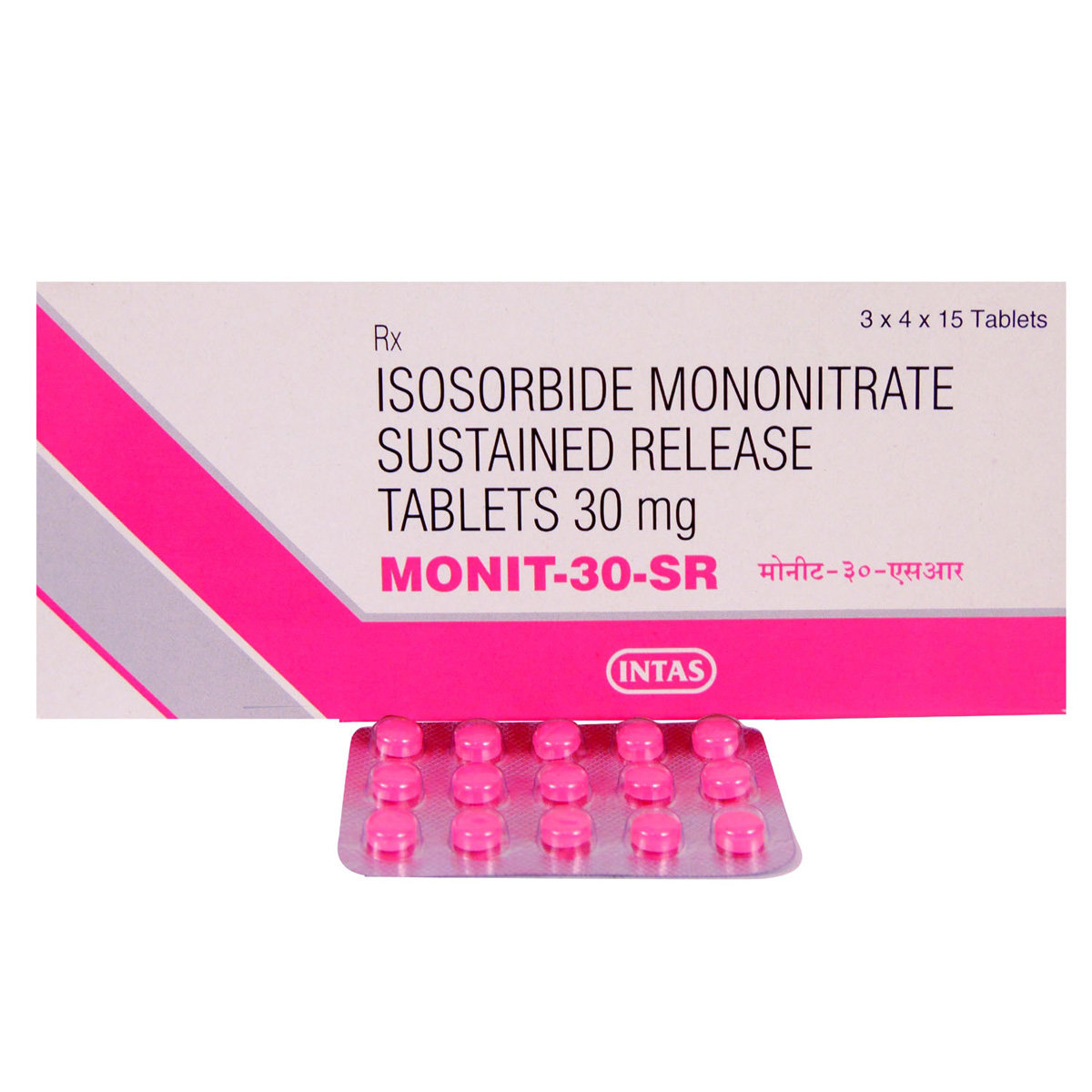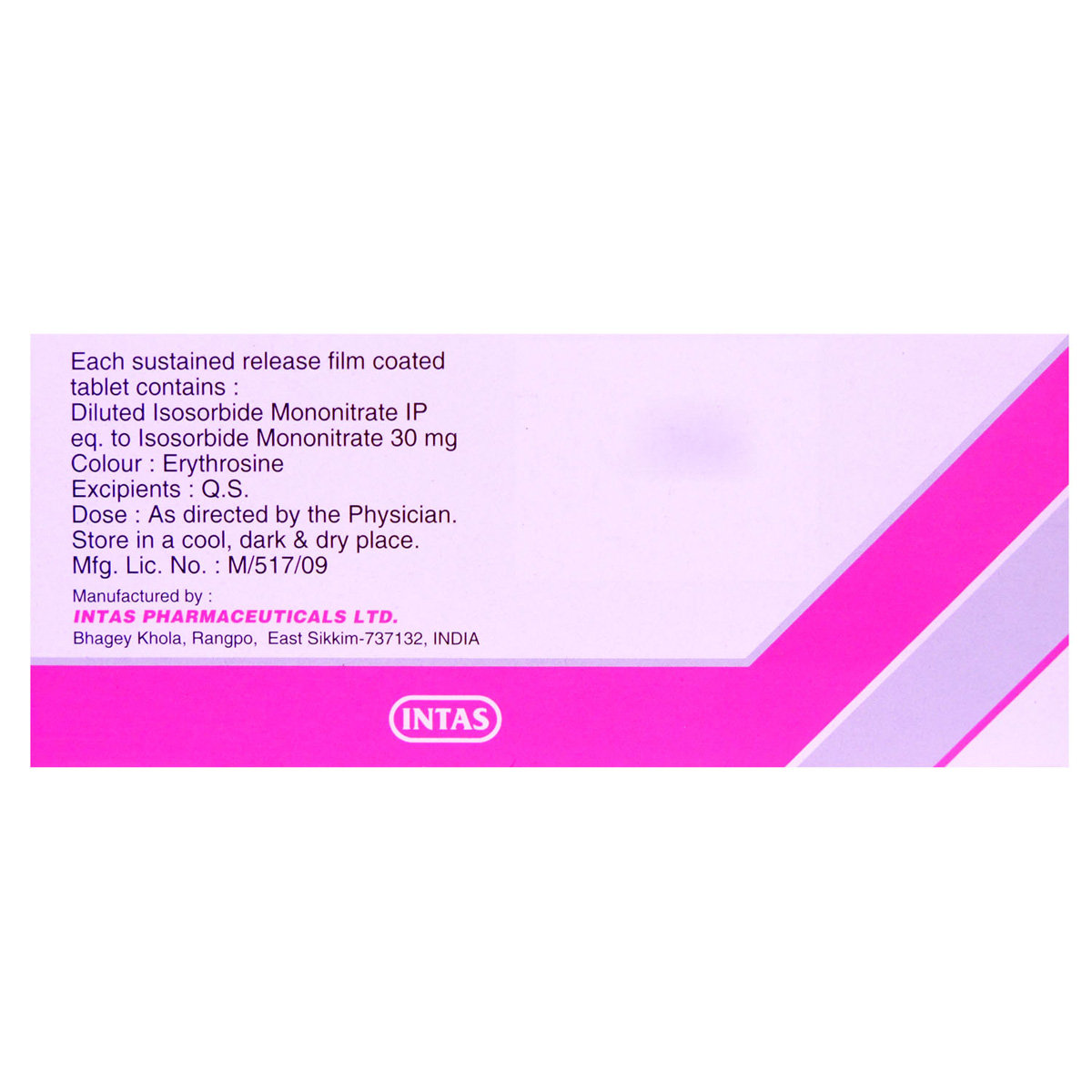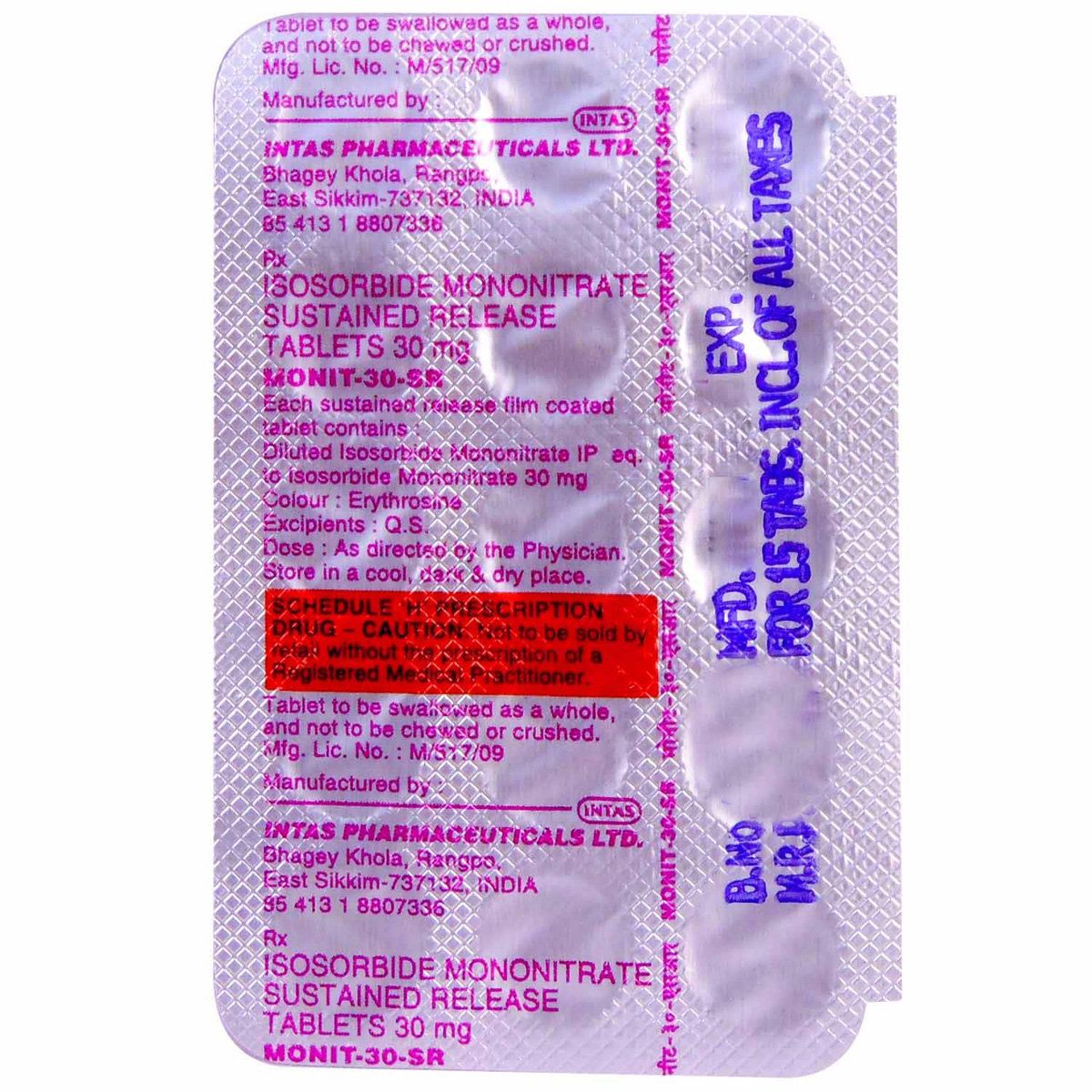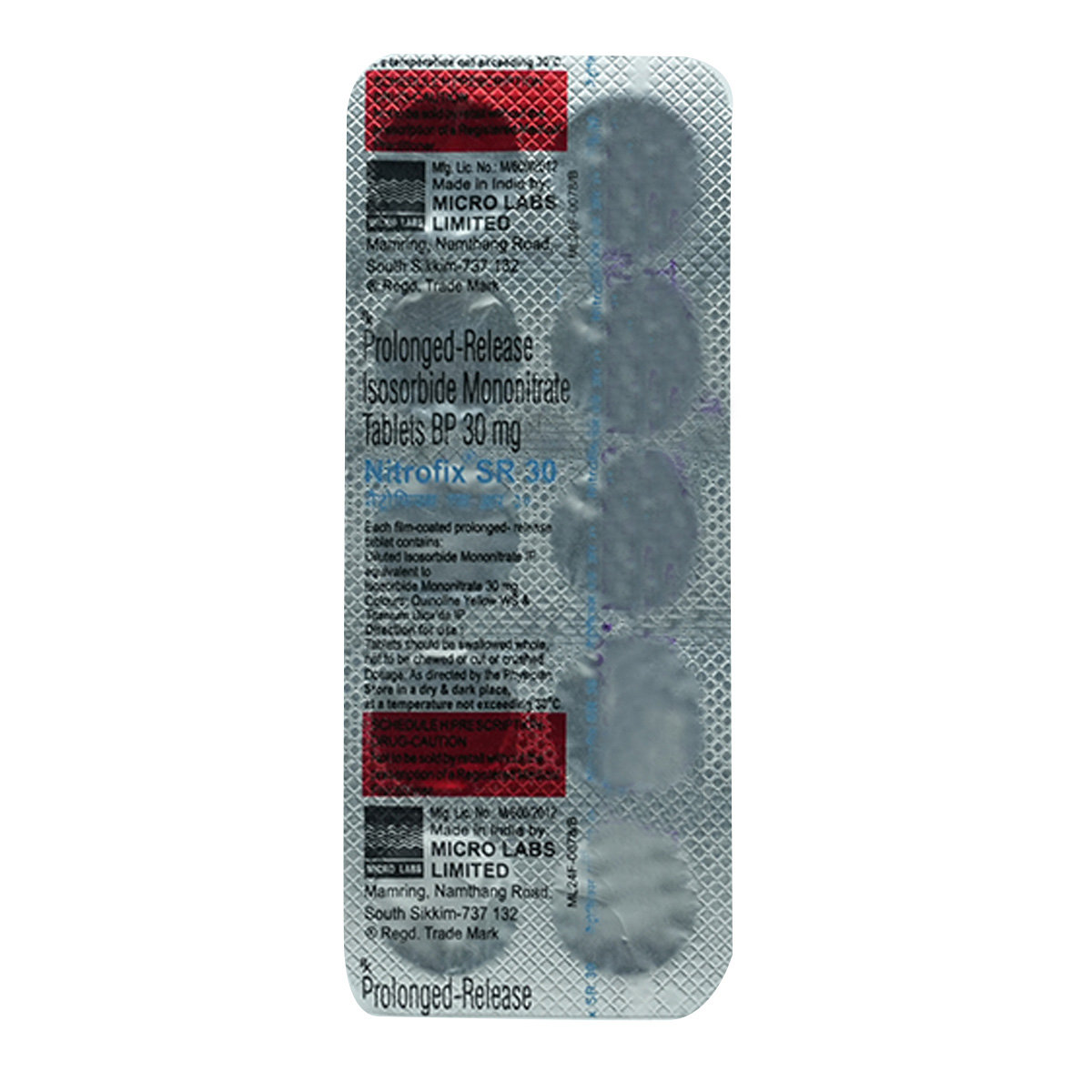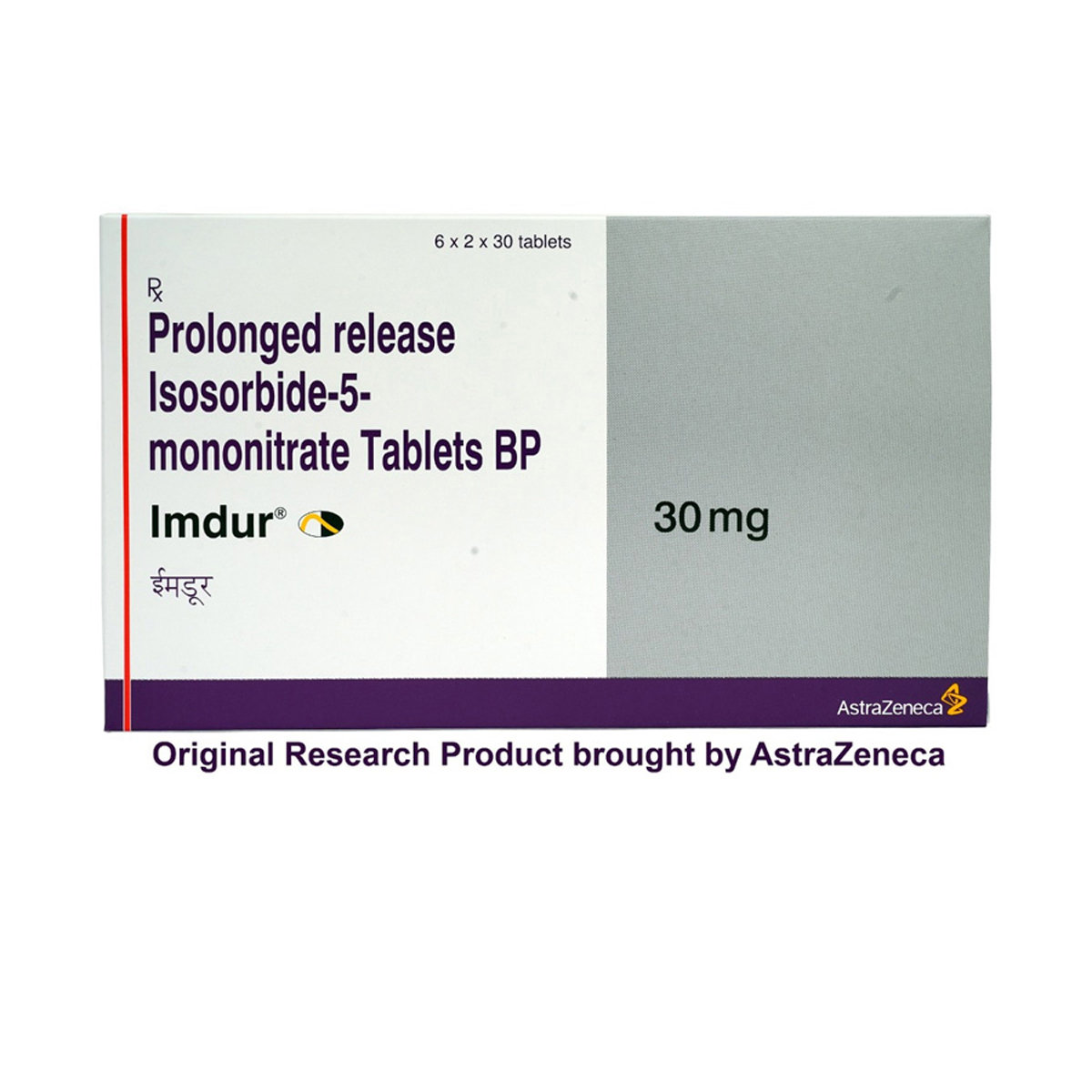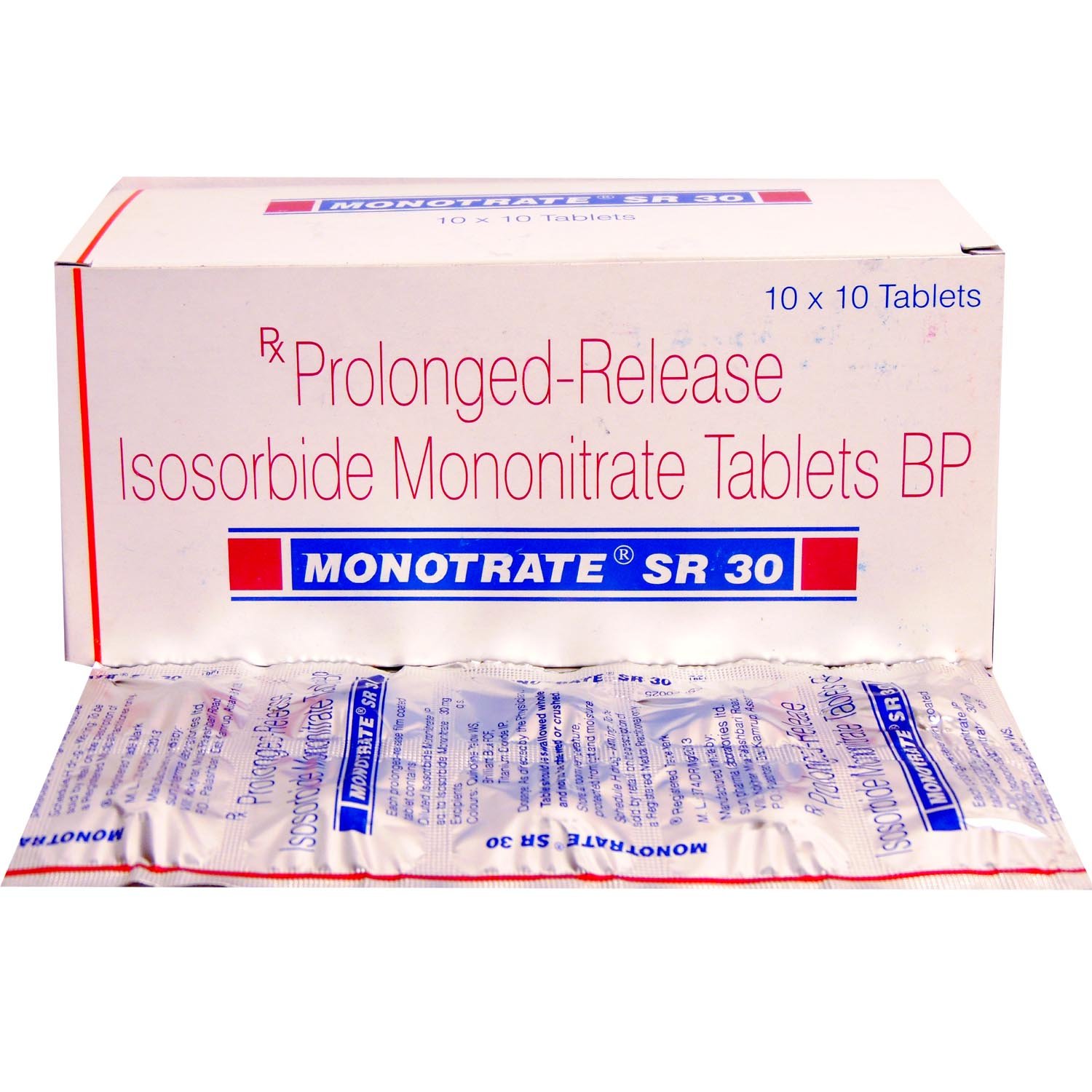Monit-30-SR Tablet 15's
MRP ₹108.5
(Inclusive of all Taxes)
₹16.3 Cashback (15%)
Provide Delivery Location
Online payment accepted
 Prescription drug
Prescription drugWhats That
Composition :
Manufacturer/Marketer :
Consume Type :
Expires on or after :
Return Policy :
About Monit-30-SR Tablet
Monit-30-SR Tablet belongs to the class of organic nitrates with blood vessel dilating activity. It is used for a heart condition called angina pectoris in which blood vessels of the heart get narrowed in an unexpected and sudden manner leading to decreased blood flow to the muscles of the heart leading to its suffocation & thus leading to a tight pain in the chest, neck or arm area.
Monit-30-SR Tablet a mononitrate form of isosorbide is a powerful vasodilator (widens blood vessels). It works by the formation of the free radical nitric oxide (NO) inside our body which leads to the relaxation of muscles of blood vessels, especially of the heart leading to proper blood flow towards the heart muscle which has been working under immense pressure due to decreased blood flow to it.
Monit-30-SR Tablet should be taken as prescribed by your doctor, with or without a meal at fixed intervals every day for best results. The dose of Monit-30-SR Tablet can vary depending upon your condition and the severity of the condition. Also, it is recommended to complete the course of medicine even if you feel better. The common side effects of Monit-30-SR Tablet include nausea, dizziness & headache. Everyone need not experience the above side effects. In case of any discomfort, speak with a doctor.
Before starting Monit-30-SR Tablet , please inform your doctor if you have any allergy (against any nitrate), have suffered a heart attack/stroke, or have an eye disease called glaucoma. Do not take Monit-30-SR Tablet on your own as, self-medication. If you are pregnant or breastfeeding, think you may be pregnant, or are planning to have a baby, ask your doctor or pharmacist for advice before taking this medicine.
Uses of Monit-30-SR Tablet
Directions for Use
Key Benefits
Monit-30-SR Tablet belongs to a class of medicines called nitrate vasodilators. These operate by relaxing the blood vessels of the heart, reducing the stress on the heart and making it easier to pump blood. Monit-30-SR Tablet is used to prevent attacks of angina pectoris. Angina usually feels like tight chest pain, neck or arm area. The pain originates from the heart muscle and is a sign that part of it is not getting enough oxygen for the amount of work it is doing.
Storage
- Hydrate your body: Drink enough water to prevent dehydration and headaches.
- Calm Your Mind: Deep breathing and meditation can help you relax and relieve stress.
- Rest and Recharge: Sleep for 7-8 hours to reduce headache triggers.
- Take rest: lie down in a quiet, dark environment.
- Cold or warm compresses can help reduce tension.
- Stay Upright: Maintain good posture to keep symptoms from getting worse.
- To treat headaches naturally, try acupuncture or massage therapy.
- Over-the-counter pain relievers include acetaminophen and ibuprofen.
- Prescription Assistance: Speak with your doctor about more substantial drug alternatives.
- Severe Headaches: Seek emergency medical assistance for sudden, severe headaches.
- Frequent Headaches: If you get reoccurring headaches, consult your doctor.
- Headaches with Symptoms: Seek medical attention if your headaches include fever, disorientation, or weakness.
- Inform your doctor about dizziness symptoms. They may adjust your medication regimen or prescribe additional medications to manage symptoms.
- Follow your doctor's instructions for taking medication, and take it at the same time every day to minimize dizziness.
- When standing up, do so slowly and carefully to avoid sudden dizziness.
- Avoid making sudden movements, such as turning or bending quickly, which can exacerbate dizziness.
- Drink plenty of water throughout the day to stay hydrated and help alleviate dizziness symptoms.
- If you're feeling dizzy, sit or lie down and rest until the dizziness passes.
- Track when dizziness occurs and any factors that may trigger it, and share this information with your doctor to help manage symptoms.
- Stay hydrated by drinking plenty of water.
- Limit caffeine, nicotine, and alcohol.
- Avoid processed foods, excess salt, and sugary drinks.
- Manage stress through relaxation techniques.
- Exercise regularly and maintain a healthy weight.
- Consult your doctor if you experience skin redness, itching, or irritation after taking medication.
- Your doctor may adjust your treatment plan by changing your medication or providing guidance on managing your erythema symptoms.
- Your doctor may recommend or prescribe certain medications to help alleviate symptoms.
- Apply cool compresses or calamine lotion to the affected skin area to reduce redness and itching.
- Stay hydrated by drinking plenty of water to help alleviate symptoms and keep your skin hydrated.
- Monitor your skin condition closely and promptly report any changes, worsening symptoms, or concerns to your healthcare provider.
- If you experience low blood pressure symptoms like dizziness, lightheadedness, or fainting while taking medication, seek immediate medical attention.
- Make lifestyle modifications and adjust your medication regimen under medical guidance to manage low blood pressure.
- As your doctor advises, regularly check your blood pressure at home. Record your readings to detect any changes and share them with your doctor.
- Fluid intake plays a vital role in managing blood pressure by maintaining blood volume, regulating blood pressure, and supporting blood vessel function. Drinking enough fluids helps prevent dehydration, maintain electrolyte balance, and regulate fluid balance.
- Take regular breaks to sit or lie down if you need to stand for long periods.
- When lying down, elevate your head with extra pillows to help improve blood flow.
- Avoid heavy exercise or strenuous activities that can worsen low blood pressure.
- Wear compression socks as your doctor advises to enhance blood flow, reduce oedema, and control blood pressure.
- If symptoms persist or worsen, or if you have concerns about your condition, seek medical attention for personalized guidance and care.
- Inform your doctor about the nausea and discuss possible alternatives to the medication or adjustments to the dosage.
- Divide your daily food intake into smaller, more frequent meals to reduce nausea.
- Opt for bland, easily digestible foods like crackers, toast, plain rice, bananas, and applesauce.
- Avoid certain foods that can trigger nausea, such as fatty, greasy, spicy, and smelly foods.
- Drink plenty of fluids, such as water, clear broth, or electrolyte-rich beverages like coconut water or sports drinks.
- Use ginger (tea, ale, or candies) to help relieve nausea.
- Get adequate rest and also avoid strenuous activities that can worsen nausea.
- Talk to your doctor about taking anti-nausea medication if your nausea is severe.
- Record when your nausea occurs, what triggers it, and what provides relief to help you identify patterns and manage your symptoms more effectively.
- Drink water or other clear fluids.
- To prevent worsening of pain, limit intake of tea, coffee, or alcohol.
- Include bland foods like rice, toast, crackers, and rice in your diet.
- Avoid lying down immediately after eating as it may cause indigestion or heartburn.
- Avoid acidic and spicy food as it may cause indigestion.
Drug Warnings
Communicate to your doctor or pharmacist before taking Monit-30-SR Tablet if a patient has low performing thyroid gland, is undernourished because of a poor diet, has severe liver/kidney problems, suffers from hypothermia (very low body temperature), suffers from very poor blood circulation, has had any lethal damage to heart such as a heart attack or suffers from a disease called glaucoma (increased pressure in the eye).
Drug-Drug Interactions
Drug-Drug Interactions
Login/Sign Up
Taking Riociguat with Monit-30-SR Tablet can cause low blood pressure.
How to manage the interaction:
Taking Monit-30-SR Tablet with Riociguat is not recommended, but it can be taken together if prescribed by a doctor. However, consult your doctor if you experience dizziness, lightheadedness, fainting, headache, flushing, heart palpitations, priapism in males (persistent and painful erection unrelated to sexual activity). Do not discontinue any medications without consulting a doctor.
Coadministration of Tadalafil with Monit-30-SR Tablet can increase the risk or severity of low blood pressure.
How to manage the interaction:
Taking Monit-30-SR Tablet with Tadalafil is not recommended, but it can be taken together if prescribed by a doctor. However, consult a doctor if you experience dizziness, or heart palpitations. Do not discontinue any medications without consulting a doctor.
Taking Monit-30-SR Tablet with tizanidine will have an additive effect and may lower blood pressure.
How to manage the interaction:
Although taking Monit-30-SR Tablet and tizanidine together can possibly result in an interaction, but it can be taken if your doctor has prescribed it. However, consult the doctor immediately if you experience symptoms such as headache, dizziness, lightheadedness, fainting, and/or pulse or heart rate changes. Do not stop using any medications without consulting doctor.
Taking Monit-30-SR Tablet with sodium nitrite may cause methemoglobinemia (blood disorder in which too little oxygen is delivered to your cells).
How to manage the interaction:
Although taking Monit-30-SR Tablet and sodium nitrite together can possibly result in an interaction, it can be taken if your doctor has prescribed it. However, consult the doctor immediately if you develop gray discoloration of the skin, abnormal blood coloration, nausea, headache, dizziness, lightheadedness, fatigue, shortness of breath, rapid or shallow breathing, a rapid heartbeat, palpitation, anxiety, or confusion. Do not stop using any medications without consulting doctor.
Taking Monit-30-SR Tablet together with dihydroergotamine can increase the effects of dihydroergotamine.
How to manage the interaction:
Although taking Monit-30-SR Tablet and dihydroergotamine together can possibly result in an interaction, it can be taken if your doctor has prescribed it. However, consult the doctor immediately if you experience an irregular heartbeat, nausea, vomiting, weakness, or coldness, numbness, chest pain or pain in the hands, feet, arms, or legs. Do not discontinue any medications without consulting a doctor.
Drug-Food Interactions
Drug-Food Interactions
Login/Sign Up
Diet & Lifestyle Advise
- Adopting a heart-healthy lifestyle will help you keep your cholesterol and blood pressure down, keep your arteries clear and avoid angina.
- Eat plenty of fruits, vegetables, whole grains and low-fat sources of protein such as nuts and fish.
- Regularly workout.
- Maintain a healthy weight and keep your diabetes in check.
- Stop smoking.
Side Effects of Monit-30-SR Tablet
- Fainting
- Low blood pressure
- Headache
- Dizziness
- Nausea
- Swelling of eyelids, face or lips
- Rash or itching especially those covering your whole body
- Exfoliative dermatitis (serious illness with blistering of the skin, mouth, eyes and genitals)
Habit Forming
Therapeutic Class
All Substitutes & Brand Comparisons
RX
Out of Stock5 MONO SR 30MG TABLET
Biochem Pharmaceutical Industries Ltd
₹28.5
(₹2.57 per unit)
60% CHEAPERRX
Out of StockCuritrat 30mg Tablet SR
Curis Lifecare
₹44
(₹3.96 per unit)
39% CHEAPERRX
Out of StockIsonitrate 30mg Tablet SR
Prevego Healthcare & Research Pvt Ltd
₹47.5
(₹4.28 per unit)
34% CHEAPER
Author Details
We provide you with authentic, trustworthy and relevant information
Drug-Diseases Interactions
Drug-Diseases Interactions
Login/Sign Up
FAQs
Take the missed dose as soon as possible, if its been too late then jumo to next dose and never attempt to take double dose as it may lead to serious harmful implications.
Strictly no, drastic fall in blood pressure is seen & is never advised except for a few antihypertensives that too only under doctors consultation.
No, ergot based drugs have been found to have interaction with Monit-30-SR Tablet thus not advised.
No, the interaction produced causes severe hypotension or decrease in blood pressure.
It can induce throbbing headache, reddening of the skin chills along with sweating, nausea, vomiting, and quick heartbeat if you take more than the prescribed dose of Monit-30-SR Tablet . Seek emergency treatment and seek urgent consultation with your doctor if you are taking more than the prescribed dosage of this drug.
Drug-Drug Interactions Checker List
- SILDENAFIL
- ISOSORBIDE DINITRATE
- CAPTOPRIL
- CLONIDINE
- MOXONIDINE
- DIHYDROERGOTAMINE
- AMITRIPTYLINE
Special Advise
- Avoid vigorous physical activity that may aggravate anginal attack.
- Avoid smoking.
- A patient should avoid places where airflow is restricted.
Disease/Condition Glossary
Angina or chest pain: It is the most common indication of heart disease caused due to decreased blood flow to heart muscles. The heart is dependent on oxygen for its functioning and pumping of blood yet sometimes due to various genetic and environmental reasons the blood vessels supplying blood to the heart narrow unexpectedly causing decreased blood flow to the heart. This abrupt decrease in blood flow leads to increased stress on the heart to pump blood towards different organs causing an event of acute chest pain that starts from the arm along the jaw and finally involves the chest. Angina pectoris is of 3 types:
1) Stable Angina: is the most common type in which blood flow to the heart is low as compared to what it needs to function, caused by increased physical activity.
2) Unstable angina: is the most lethal type in which blood supply to the heart decreases abruptly due to blockage of the artery by a clot etc.
3) Variant angina: occurs at rest due to spasmic narrowing of the artery.

Have a query?
Alcohol
Safe if prescribed
Do not drink alcohol. It could increase the effect of Monit-30-SR Tablet and lower your blood pressure too much. If this happens, you may feel dizzy or faint.
Pregnancy
Consult your doctor
If you are pregnant, think you may be pregnant or are planning to have a baby, ask your doctor or pharmacist for advice before taking this medicine.
Breast Feeding
Consult your doctor
If you are a breast-feeding mother, think you may be pregnant or are planning to have a baby, ask your doctor or pharmacist for advice before taking this medicine.
Driving
Safe if prescribed
Monit-30-SR Tablet may give you headache, blurred vision or make you feel dizzy or tired make sure you are not affected before you drive or operate machinery.
Liver
Consult your doctor
A patient is advised to take this drug only on doctor's consultation as there have been reports of interactions between liver patients and Monit-30-SR Tablet .
Kidney
Consult your doctor
A patient is advised to take this drug only on doctor's consultation as there have been reports of interactions between Kidney patients and Monit-30-SR Tablet .
Children
Safe if prescribed
Not to be given in children unless prescribed by a doctor.
Recommended for a 30-day course: 4 Strips

